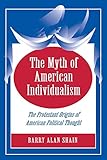The Myth of American Individualism : The Protestant Origins of American Political Thought / Barry Alan Shain.
Material type: TextPublisher: Princeton, NJ : Princeton University Press, [2021]Copyright date: ©1994Description: 1 online resource (415 p.)Content type:
TextPublisher: Princeton, NJ : Princeton University Press, [2021]Copyright date: ©1994Description: 1 online resource (415 p.)Content type: - 9780691224992
- HISTORY / United States / Revolutionary Period (1775-1800)
- Baptists
- Bill of Rights
- Boston Massacre
- British Constitution
- Calvinism
- Delaware Constitution
- European bankers
- First Amendment
- German totalitarianism
- Jeffersonians
- Kendall, Willmoore
- Kloppenberg, James
- Madison, James
- Revolutionary War
- Roman republicanism
- abolitionists
- ambition
- anarchism
- anthropocentrism
- civil liberty
- communalism
- despotism
- direct democracy
- disasters
- economic enterprises
- elites
- emergent individualism
- familial independence
- federalism
- gossip
- happiness
- historiography
- inalienable rights
- intermediate institutions
- liberalism
- liberty
- localism
- majoritarianism
- minorities
- national government
- nationalism
- natural liberty
- old Revolutionaries
- pamphlet literature
- personal liberty
- police powers
- political liberty
- prescriptive liberties
- publishing industry
- rationalism
- reciprocal dependence
- 320.5/12/097309033
- online - DeGruyter
| Item type | Current library | Call number | URL | Status | Notes | Barcode | |
|---|---|---|---|---|---|---|---|
 eBook
eBook
|
Biblioteca "Angelicum" Pont. Univ. S.Tommaso d'Aquino Nuvola online | online - DeGruyter (Browse shelf(Opens below)) | Online access | Not for loan (Accesso limitato) | Accesso per gli utenti autorizzati / Access for authorized users | (dgr)9780691224992 |
Frontmatter -- CONTENTS -- ACKNOWLEDGMENTS -- PREFACE -- INTRODUCTION -- PART ONE: STANDING: THE PUBLIC GOOD, THE INDIVIDUAL, AND THE COMMUNITY -- CHAPTER ONE Three Discourses in Defense of the Public Good -- CHAPTER TWO A Sketch of 18th-Century American Communalism -- CHAPTER THREE Localism and the Myth of American Individualism -- CHAPTER FOUR Three Leading Views of the Individual, Plus One -- PART TWO: THE MEANING OF LIBERTY IN THE REVOLUTIONARY ERA -- CHAPTER FIVE A Delusive Similarity: (Ordered) Liberty and Freedom -- CHAPTER SIX Spiritual Liberty: The Quintessential Liberty -- CHAPTER SEVEN Corporate Liberty: Political and Civil -- CHAPTER EIGHT The Concept of Slavery: Liberty's Antithesis -- AFTERWORD -- BIBLIOGRAPHY -- INDEX
restricted access online access with authorization star
http://purl.org/coar/access_right/c_16ec
Sharpening the debate over the values that formed America's founding political philosophy, Barry Alan Shain challenges us to reconsider what early Americans meant when they used such basic political concepts as the public good, liberty, and slavery. We have too readily assumed, he argues, that eighteenth-century Americans understood these and other terms in an individualistic manner. However, by exploring how these core elements of their political thought were employed in Revolutionary-era sermons, public documents, newspaper editorials, and political pamphlets, Shain reveals a very different understanding--one based on a reformed Protestant communalism. In this context, individual liberty was the freedom to order one's life in accord with the demanding ethical standards found in Scripture and confirmed by reason. This was in keeping with Americans' widespread acceptance of original sin and the related assumption that a well-lived life was only possible in a tightly knit, intrusive community made up of families, congregations, and local government bodies. Shain concludes that Revolutionary-era Americans defended a Protestant communal vision of human flourishing that stands in stark opposition to contemporary liberal individualism. This overlooked component of the American political inheritance, he further suggests, demands examination because it alters the historical ground upon which contemporary political alternatives often seek legitimation, and it facilitates our understanding of much of American history and of the foundational language still used in authoritative political documents.
Mode of access: Internet via World Wide Web.
In English.
Description based on online resource; title from PDF title page (publisher's Web site, viewed 30. Aug 2021)


